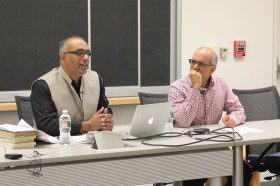By Ghazal Gulati, Ed.M Candidate, Harvard Graduate School of Education
“Writing that cannot be erased, ought not to be written” – Allama Prabhu
As part of its South Asia Without Borders Series, SAI hosted a seminar on Friday, April 3 with Dr. Prithvi Datta Chandra Shobhi, a social historian and Assistant Professor of History at the Department of History, Karnataka State Open University, Mysore, India. The event was chaired by Parimal G. Patil, Professor of Religion and Indian Philosophy, Committee on the Study of Religion, FAS, Chair of the Department of South Asian Studies.
Dr. Shobhi began by framing his discussion against the broader issue of Bhakti, or, devotional poetry, and its interpretation. He cautioned the audience to resist reducing this unique form to modern poetry. He spoke of the importance of this literary tradition in both Sanskrit and vernacular literature.
Dr. Shobhi then shifted his focus to Allama Prabhu, the 12th century vacanākara (maker of vacanas) and mystic. He gave a comprehensive account of Allama’s life and located his work in Virasaiva history. Based on his extensive research, Dr. Shobhi illustrated the transformation of the representation of Allama in the Virasaiva community. This transformation led to Allama being installed as the central figure around which Virasaiva discourse was recreated.
Several of Allama’s vacanas were shared with the audience, along with translations from the medieval period. Dr. Shobhi pointed out how several times the translations may have a clear disconnect with the literal meaning of Allama’s vacanas. These had a clear impact on how Allama’s poetry is viewed by readers even today.
Allama’s style was unique, sometimes cryptic and difficult to translate. Allama did not believe that anubhāva, the mystical divine experience, could be articulated through poetry, and thus set up for his poetry an impossibility as its task: articulation of the inarticulable. Allama had a distinctive style by deploying Tantric vocabulary, and by using allusive propositions.
Dr. Shobhi then offered several unique learnings from Allama’s work for today’s political context. First, Allama’s work offers a unique way to speak of religion in India’s political sphere. Second, the ability of the poet to articulate mystical experiences and yet keep the audience engaged is a valuable lesson.
The seminar ended with an engaging Q&A session. The audience and speaker discussed in detail Allama’s place in the Lingayat community, as well as the boundaries of freedom of open ended literary interpretation.

